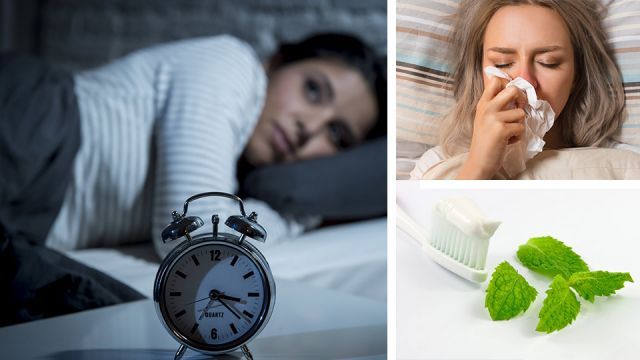
If you’ve ever tossed and turned all night, or it’s taken you hours to fall asleep finally, you know how torturous insomnia can be. Between 50 and 70 million Americans have a sleep disorder, so most of us are familiar with the standard triggers for insomnia, like too much caffeine, working the graveyard shift or reading your phone for hours in bed. But some of the things that cause insomnia are pretty bizarre, including what kind of toothpaste you use at night.
1. Allergies
There’s this funny thing about the body: it wants oxygen. So when you’re trying to sleep and your sinuses are clogged, you don’t sleep well. Your breathing isn’t as good when you’re dealing with an allergic reaction, be it from pollen or dust mites in your bedroom. It can even cause subconscious breathing anxiety which will keep you awake, according to Dr. Jerald Simmons of Comprehensive Sleep Medicine Associates in Houston.
2. Medications
Unfortunately, allergy medications can cause insomnia, so taking them to ease your allergies could just be trading out one problem for another. Other medications that can cause you to toss and turn include dopamine agonists used to treat Parkinson’s, amphetamines, cold medicines, steroids, beta blockers and other blood pressure medications, diuretics and appetite suppressants.
3. Mint toothpaste
Do you brush your teeth with peppermint toothpaste before bed? You might want to switch to a different flavor. Peppermint oil has a stimulating effect on the mind and body, and studies show that it can also reduce a feeling of sleepiness. That’s great when you’ve got it in the diffuser at work or while the kids study, but not so great right before bed.
4. Sleep apnea
While it’s difficult to pinpoint if sleep apnea causes insomnia or the other way around, the two are correlated. Depending on the source you read, 39 to 58 percent of people with obstructive sleep apnea (OSA) also have insomnia. A 2012 pilot study, published in the journal Sleep, found that 18 of the 20 patients in the study experienced sleep-disordered breathing. Eleven of those patients were diagnosed with OSA. If you find that you wake up a lot during the night, it might be worth the trip to visit your doctor and find out if you have sleep apnea.
5. Chronic pain
If you suffer from chronic pain, whether from back pain to pain associated with cancer, or anything in between, you likely also experience insomnia. Dr. Robert Bolash, from the Cleveland Clinic’s Department of Pain Management says, “Pain worsens sleep patterns, and sleep disturbances worsen pain — it’s a vicious cycle.” Behavioral therapy seems to be the best way to combat chronic pain-induced insomnia, after you eliminate other insomnia triggers.
6. Depression
People diagnosed with major depressive disorders have a higher risk of severe insomnia than the rest of the population. Much like the cycle of chronic pain and insomnia, insomnia can cause even more depression. It also leaves you with lower energy, a loss of motivation or feelings of helplessness. As if that weren’t enough, insomnia can exacerbate anxiety, which often accompanies depression. Anxiety over not getting enough sleep can simply add fuel to the fire and keep you up at night.
7. Eating close to bedtime
If you eat too close to your bedtime, you might experience insomnia or nighttime heartburn, which can rob you of precious sleep hours. Generally, you should not eat two to three hours before bed. Avoid drinking alcohol before bed, too. It can make you feel sleepy at first but then lead to insomnia later in the night. If you need a snack before bed, opt for a glass of warm organic milk, or food that helps the body produce melatonin like turkey or cherries.
8. Neurological conditions
Insomnia can sometimes signal that something is wrong on a neurological level. In fact, it’s often a clinical sign of an underlying disease that involves the central nervous system. Patients with Parkinson’s, Alzheimer’s and other degenerative neurological disorders often live with insomnia. Unfortunately, some of the same medications that these patients are prescribed can cause sleep problems as well, making for a very unfortunate catch-22 for some.
9. Restless legs syndrome
For people with restless legs syndrome, a condition that gives you an uncomfortable sensation in your legs that’s only relieved by moving them, insomnia can be a real problem. Up to ten percent of the population lives with restless legs syndrome, and four percent of those people have trouble sleeping as a result. As with many of the conditions on our list, insomnia makes restless legs syndrome worse. Getting your iron levels checked, going to sleep earlier and cutting back on your caffeine intake can help.
10. Traveling eastward
We all know that flying overseas can cause jet lag but just traveling eastward a couple of time zones can have a large impact on how well you sleep. When you travel from Los Angeles to New York City, for example, you land three hours later in the day than you internal body clock thinks it is. So, midnight in NYC will still feel like 9:00 p.m. to your body. If possible, plan some extra time into your schedule to catch up on your z’s.
What else causes you to have insomnia? Let us know in the comments below!
— Megan Winkler

